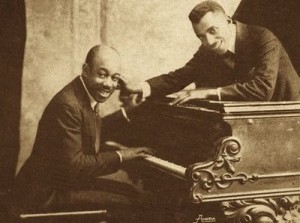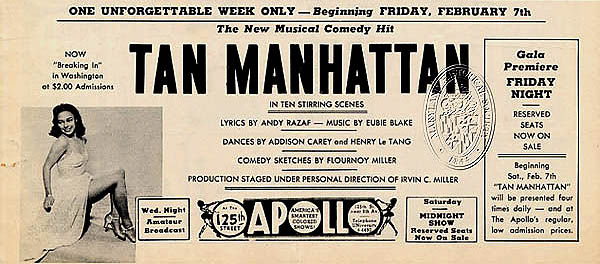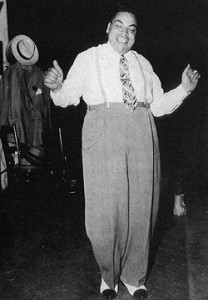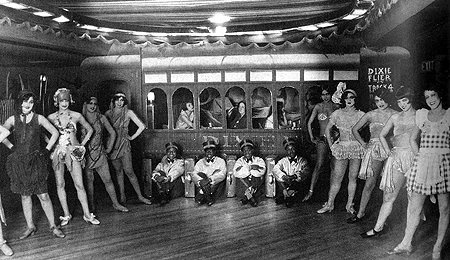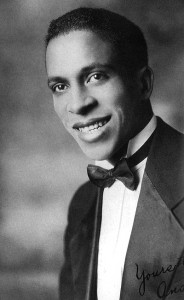
Composer Andy Razaf, “The Melody Man.” Photo courtesy Schomburg Center for Research in Black Culture.
Romance is seldom as clear as black and white. But there was a time in America's pop entertainment when love songs seemed destined to be divided along these lines. Ballads by white tunesmiths were often celebrated, but it was taboo for black performers to even sing about romantic love.
As early as 1913 composers like Jerome Kern were writing romantic songs for musicals that had young couples 'cuddling and canoodling' onstage. Black songwriters and producers, on the other hand, risked having their actors booed—or worse—if they portrayed romance onstage between 'couples of color.' On the subject of love just about the only territory open to them was the 'down-hearted, love-gone-wrong blues' of shouters like Gertrude 'Ma' Rainey, or bawdy 'hokum blues' like "What it Takes to Bring You Back, Your Mama Has It All the Time" from the comedy duo Butterbeans and Susie.
That was the way it was until Noble Sissle and Eubie Blake wrote their ballad "Love Will Find a Way"—and were brave enough to put it into their pioneering Broadway stage musical Shuffle Along produced in 1921. In that year the civil rights and black pride movements of the 1950s and 60s lay far in the future. The smashing success of "Love Will Find a Way" and Shuffle Along among white and black audiences alike broke the mold on Broadway—and the 1920s saw an avalanche of songs by black composers and lyricists.
This week, in honor of Black History Month, Riverwalk Jazz and The Jim Cullum Jazz Band take note of Valentine's Day with songs created by the first black composers to turn out love songs for mainstream America via Broadway, Vaudeville and Tin Pan Alley.
Musical guests on our Ebony Love Songs Valentine's Concert include former Basie Band vocalist Joe Williams in an encore performance, film and Broadway actors Vernel Bagneris and Carol Woods, jazz singers Topsy Chapman and Stephanie Nakasian, and instrumentalists Bob Barnard, Bob Schulz, Clint Baker, and Dick Hyman.
One of the first pop songwriters to cross the color line with a series of hits was New Orleans native Spencer Williams. His "Everybody Loves My Baby" of 1924 is a jazz band and jam session favorite to this day.
The grandnephew of the Queen of Madagascar, lyricist Andy Razaf was known for the subtly nuanced and beautifully crafted language of his lyrics. He teamed up with Eubie Blake to create the enduring love ballads "Memories of You," "You're Lucky to Me" and the very affecting and wistfully nostalgic "I'd Give a Dollar for a Dime." With the legendary Harlem Stride pianist and songwriter Thomas 'Fats' Waller, Razaf turned out a string of hit shows and revues that produced the popular songs "Ain't Misbehavin,'" "Squeeze Me" and lesser known gems like "I Had to Do It."
Bandleader and song publisher Maceo Pinkard established himself as a songwriter in 1920s New York with hits that remain popular jazz standards and are often heard on movie soundtracks. He wrote the familiar "Sugar," "Sweet Georgia Brown," and on our show this week "I'll Be a Friend With Pleasure" and "Them There Eyes," a hit for Billie Holiday.
Also heard on this week's program are classic love songs composed and made popular by jazz instrumentalists such as Louis Armstrong's "If We Never Meet Again," "It's Wonderful" by 52nd Street violinist 'Stuff' Smith, "A Monday Date" by piano pioneer Earl Hines and "Creole Love Call" by Duke Ellington.
Photo credit for Home Page: Ethel Waters and Earl Hines in "Blackbirds,"1930 edition. Photo courtesy Frank Driggs.
Text based on Riverwalk Jazz script by Margaret Moos Pick © 2011


